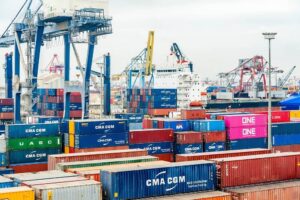In the future of Global Trade that I see ahead of us, the inevitability of unlimited data access is coming faster than we might suspect. In fact, some might argue its already here. If you already know exactly where your container is on the water, exactly when your customer needs that container and exactly how much that container is going to provide in profit to your business before sending or receiving and invoice, what more is there really? You’ve optimized your business efficiency and transactions are running smoothly, hopefully thanks to the help of your friendly neighborhood software company, VISCO.
But what if optimizing isn’t enough anymore? Maybe it’s become too easy to optimize and all your competitors have followed suit ensuring that their container visibility, customer communication and profit calculations are also fully automated?
An unconventional consolidation has occurred in technology for Global Trade companies over the last decade. With the increasing availability of APIs and the widespread acceptance of Software as a Service (SaaS) for small to medium sized businesses (SMBs) in our industry, consolidation of data is just an integration away.
So how can a Global Trade company using VISCO continue to grow in the increasingly competitive marketplace where startup costs are at an all time low? Well, I, for one, believe the answer is Data Science.
According to the team at Amazon Web Services, Data science is the study of data to extract meaningful insights for business. It is a multidisciplinary approach that combines principles and practices from the fields of mathematics, statistics, artificial intelligence, and computer engineering to analyze large amounts of data. This analysis helps data scientists to ask and answer questions like what happened, why it happened, what will happen, and what can be done with the results.
That all sounds incredibly “heady” to me, and should likely be reserved for classroom discussions, theoretical analysis and Fortune 100 budgets. But what if us “scrappy upstarts” could get into “big-data” or “data mining” with limited cost and effort involved while we continue to run our SMBs?
I’m glad you asked, because I have some ideas. But it starts by asking the craziest questions, here are some I’ve been wondering about myself.
- What percentage of all VISCO Containers have a Date in Transit that is at least one week after their ETD?
- What Vendors, Ports of Origins and Freight Carriers are most often responsible for these delays?
- What Destination Cities and International Ports are yielding the most profit among all VISCO Customers?
- How can VISCO start to predict trends around supply chain decisions based on the answers to the questions above and help inform our customers months before their competitors?
We have access to all of this data already and the ability to consolidate and query quickly thanks to solid design from our developers and modern technology at its finest. Its just a matter of asking the right questions, getting the right approvals from our customers and building a base of supporters who are enthusiastic about the results we produce from this macro-analysis.
The Data Science approach to solving long-term business problems is still relatively new for SMBs, but in the never-ending quest for efficiency among our customers, I aim to lead this charge towards full automation with a nice side helping of Data Science to improve decision making for our customers through big data collaborations. So, who’s with me?





